Gaea Schoeters in Leipzig: “Support works”
From the kick-off in Amsterdam to the final party in Leipzig, Gaea Schoeters was everywhere. As author of the gripping, disconcerting novel ‘Trophy’ (translated into German by Lisa Mensing) and as a representative of the Fixdit collective, she was given pride of place in the Guest of Honour programme in Leipzig. Gaea kept a diary for us.
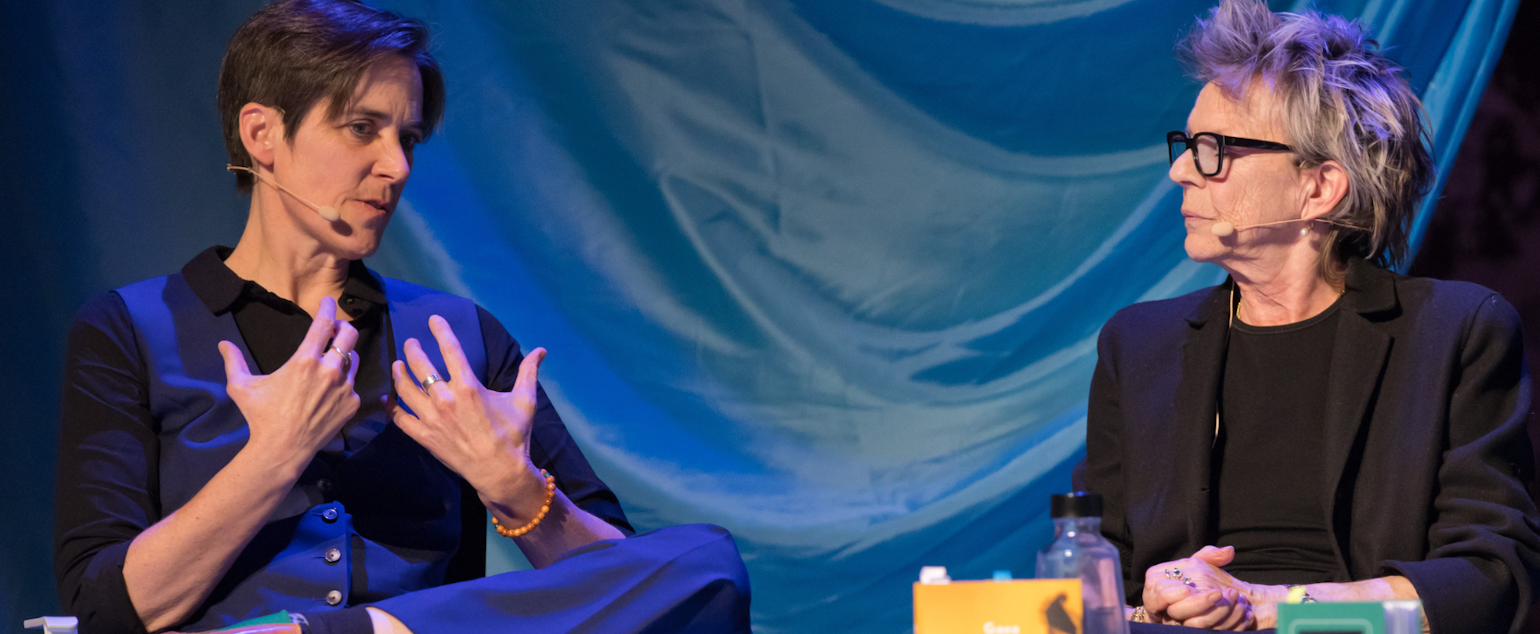
Amsterdam, 23 January 2024
Surrounded by books in the beautiful Dutch House of Literature, Mireille Berman, member of staff at the Dutch Foundation for Literature and coordinator of the Guest of Honour programme, and Paul Hermans, director of Flanders Literature, kick off the programme of Flanders and the Netherlands as Guest of Honour at the Leipzig Book Fair. Around the table are some thirty German-language journalists, who spend two days getting to know the participating authors. Curators Bettina Baltschev and Margot Dijkgraaf present the five key points of the programme:
- new voices, new perspectives
- attention to children’s and young adult literature
- without translators, no world literature
- literature is more than paper
- sustainability, in literature too.
In the month that follows, I will personally learn from experience that these are more than vague slogans. Point one, new voices, new perspectives, we can tick a little later, during the literary speed dates.
A baptism of fire follows immediately: an interview for Austrian television. When Zsolnay, my publisher in Vienna, bought the translation rights of ‘Trophy’, I promised them I’d learn German within the next year and a half. I dutifully watched ‘Tatort’ every Sunday, played Duolingo every day and struggled my way through several online courses given by the Goethe Institute. I certainly don’t speak it faultlessly, but fortunately the Germans are forgiving of foreigners’ grammar.
Berlin, 31 January 2024
I notice that same appreciation of my enthusiastic attempts the following week, at the press conference in Berlin. While we’re about it, we record my ‘Kopje Koffie’, the Dutch-Flemish book podcast in which Dutch authors with a new German book translation talk about their work. Meanwhile I’m already finding the right words twice as easily.
Cologne, 16 February 2024
The Long Night of Dutch and Flemish Literature is the unofficial book launch of ‘Trophaë’, excellently translated into German by Lisa Mensing. I’m somewhat dumbfounded by the way that in Germany literature is contextualized (and valued). For three hours a packed audience sits listening breathlessly to interviews with relatively unknown foreign authors (made possible by a simultaneous translation), which alternate with excerpts read by actors. After that the entire programme is broadcast on the radio, twice. Even for me, it’s a wonderful chance to discover, or rediscover, the work of Gerbrand Bakker, Lize Spit, Fien Veldman, Jaap Robben and Peter Zantingh; we don’t see each other that often.
Afterwards I stay on with Lisa, with whom (fortunately) I get on very well, because your translator is your ambassador. Her reader’s report convinced the publisher and it’s a result of her linguistic skills that the book has received so much stylistic praise. As an author abroad, you’re only as good as your translator, and their work all too often remains invisible. That’s why I interview my translators, for my blog series ‘Found in Translation’. Tick number two: without translators, no world literature. Especially now that we’re losing so many readers to English, the young in particular, their work is invaluable in safeguarding the diversity of European literature. We’re also amazed at the cultural differences in reviewing; giving away the plot is perfectly normal here. A shame, because you read differently when you know in advance what’s coming. Positive, though, is the amount of attention that’s paid in interviews to style, intertextuality and form. Here the book clearly takes precedence over the autobiographical.
Berlin, 17 February 2024
From Cologne I take the train to Berlin, where the authors of Fixdit, a collective that works for gender equality in literature, have a residence in the Literarisches Colloquium (LCB) in relays. For a month we’ll brainstorm with our German colleagues about solutions to sexism, and prepare an international manifesto. We’ll also get to know each other better, since it’s the first time I’ve met some of my Dutch colleagues in the flesh. We walk, talk, organize workshops or evenings for the public, meet Indonesian colleagues in the digital Vooo-space and exchange knowledge and ideas.
It’s also in the LCB that I officially launch ‘Trophaë’, along with ‘my’ translator Lisa. The advance copies that Zsolnay has sent to journalists, bloggers and bookshops ahead of publication are proving a good move. The buzz is growing by the day – as is clear from the invitation by television broadcaster ZDF to go clay pigeon shooting for their cultural magazine programme ‘Aspekte’. The morning after the book launch, I’m at the stand at daybreak with presenter Jo Schück. And I have to admit that when I hit the target, my adrenaline shoots up.
Vienna, 17 February 2024
From Berlin I travel to Vienna, where the terrific team at Zsolnay, which as well as a publisher also functions as an agent and press bureau, has planned a packed day. For three hours the journalists take it in turns, then publisher Bettina Wörgötter interviews me in one of the biggest bookshops in the city, whose owner predicts a brilliant future for the book. Nothing nicer than a compliment from a bookseller; after all, who knows better what’s going on in literature? So another round of speed dates with journalists and booksellers follows, during dinner at the Flemish Representation. Towards midnight my German is exhausted.
Leipzig, 8 March 2024
International women’s day. Along with composers Annelies Van Parys and Sara Glojnaric, I size up the situation regarding sexism and equal opportunities in opera and musical theatre. Two days later, in the Schaubühne Lindenfels, our chamber opera ‘Notwehr’ has its German première, a piece with two major roles for women and one of the very first lesbian love scenes in operatic history. Another frontier pushed back, and with that a third tick: literature is more than paper. There are posters all over the city, the theatre is full, the audience is strikingly young and the manager of the Leipzig opera is wildly enthusiastic. After the performance, more interested music programmers come forward: the prelude to another tour next year.
For a whole month this wonderful theatre is the home base for the performing arts during the Guest of Honour programme. Flyers announce the coming of ‘Befallene Stadt’, one of the Van Ostaijen projects by Matthijs De Ridder and deBuren. Their exhibition will alight here too, alongside performance poets.
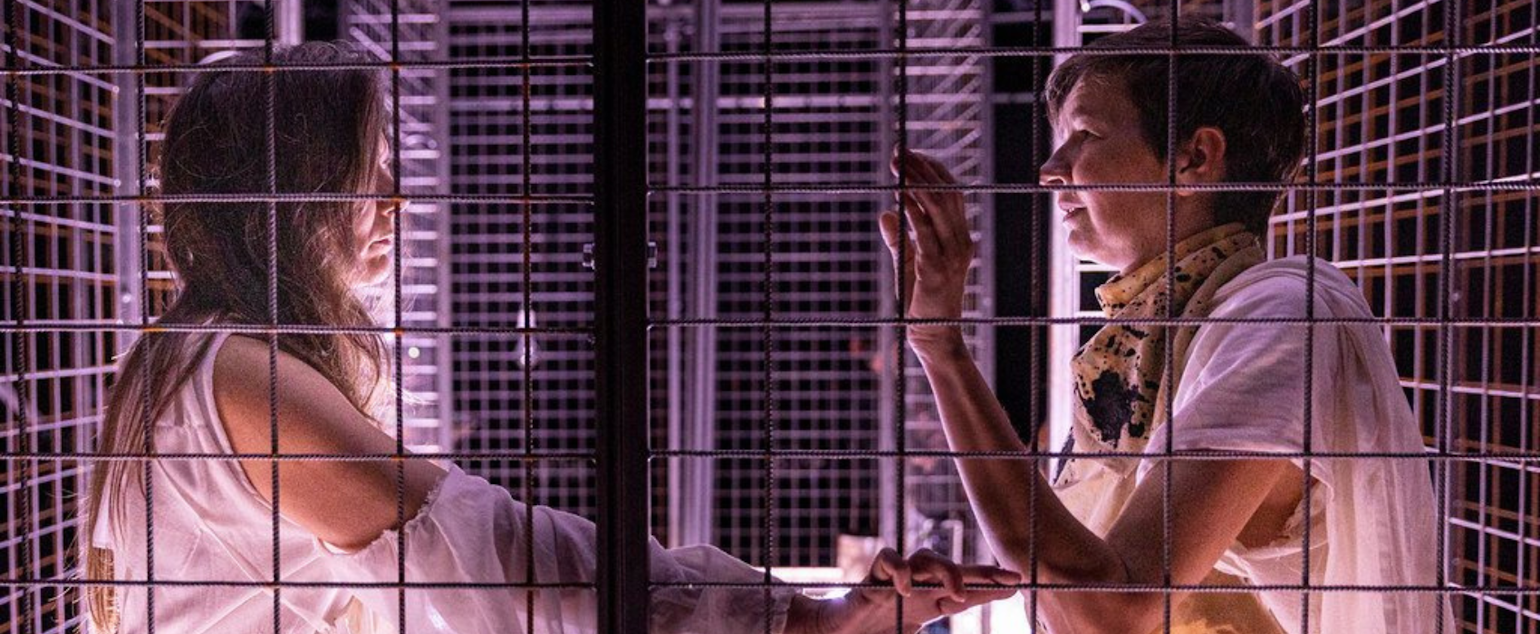
Ghent, 16 March 2024
The German broadcaster ARD sends a camera team to Ghent to record a piece for ‘ttt - titel, thesen, temperamente’. Yesterday I spoke to a Swedish radio journalist. And television critic Denis Scheck, himself a keen hunter, praised ‘Trophaë’ in ‘Druckfrisch’, a legendary book programme in which novels sometimes end up in the bin – immediately earning me an extra, third printing, with his quote on the cover. All the media attention is bearing fruit; Lisa tells me we’re on the amazon.de bestseller list.
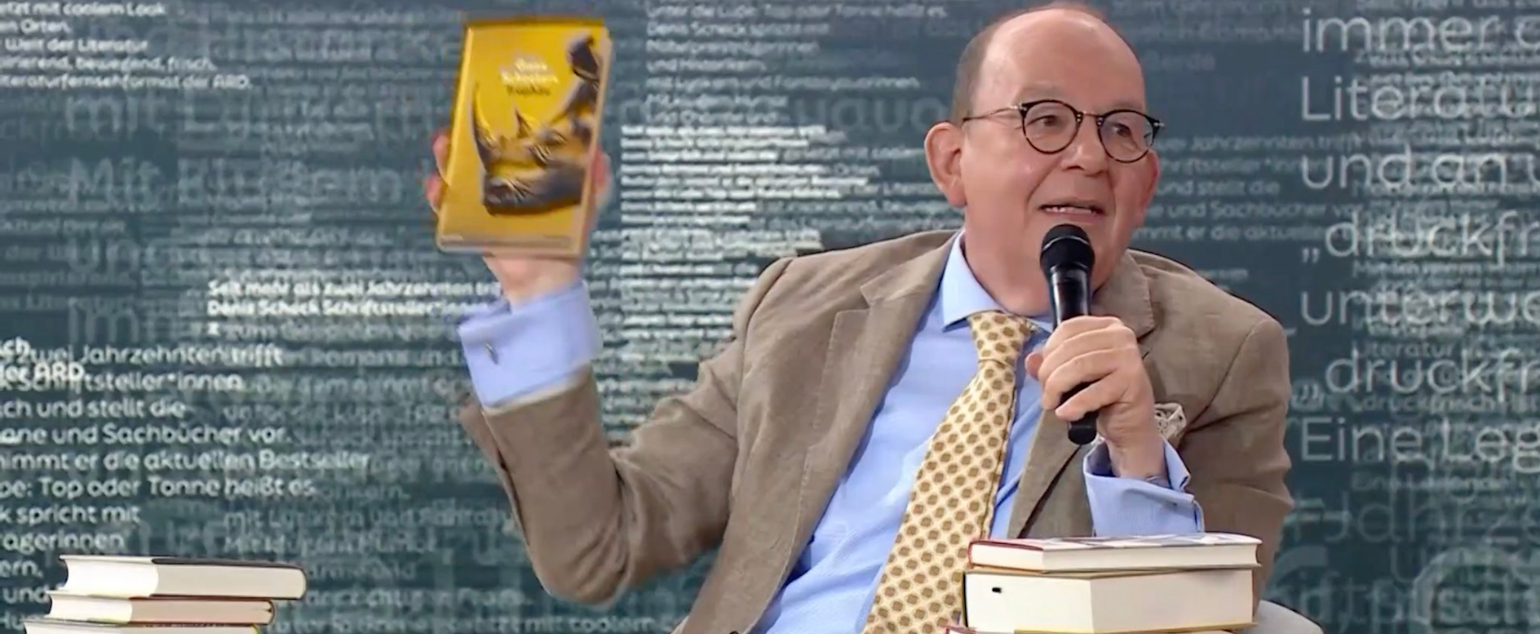
Leipzig, 21 March 2024
Who is still reading? asks a poster at the station in Leipzig when I arrive. A lot of people, it seems, because the Book Fair has attracted 283,000 visitors in four days. And it’s impossible for them to overlook the Guest of Honour, since the striking house style pops up everywhere in the streets. As well as readings within the framework of ‘Alles ausser flach’ (Anything but flat), Zsolnay has done a good job of filling my schedule; I’m on the go from early morning to midnight. From the official opening at the Guest of Honour stand I run to the big ARD stage. I happen to bump into Denis Scheck, who recommends the book again. It seems he really is a fan – reason enough for a quick selfie.
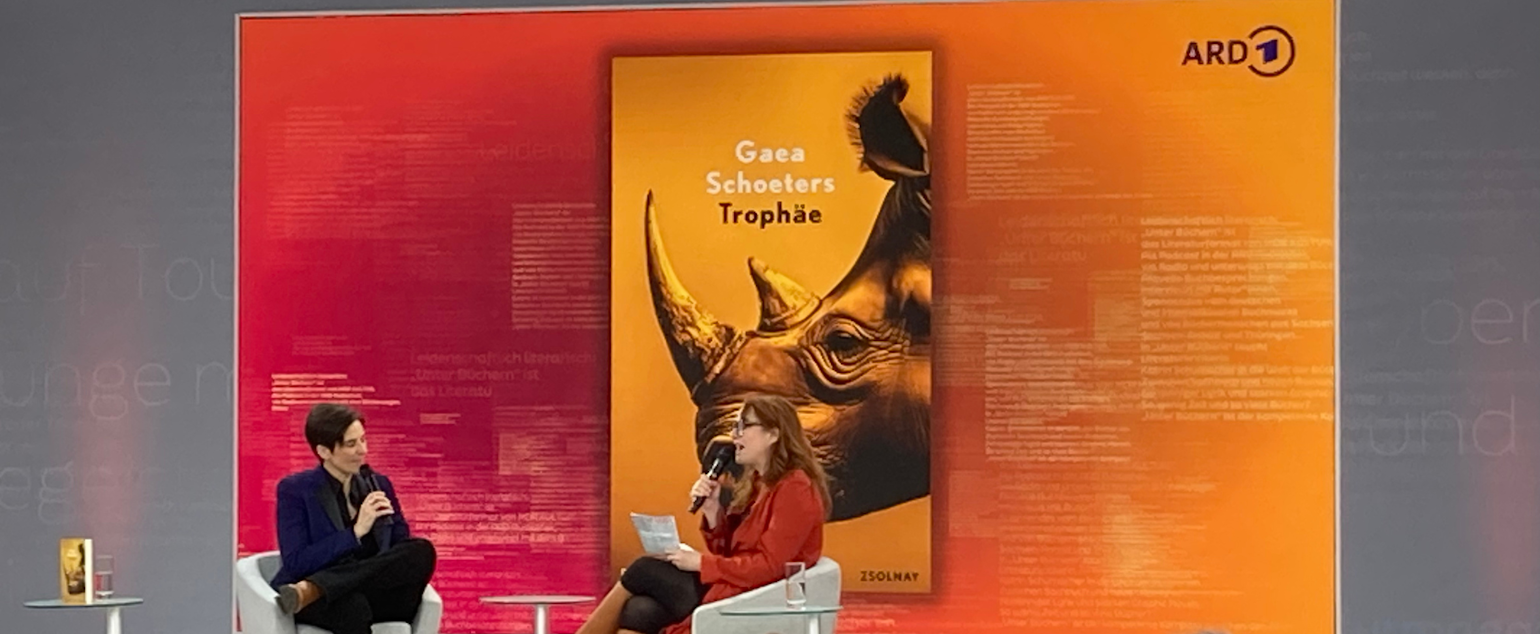
Three interviews later I race back to the Guest of Honour stand, where Federal President Frank-Walter Steinmeier calls by. When I press ‘Trophaë’ into his hands, he makes a reference to the German colonial past in Namibia. “Not simple.” “That’s what literature’s for: to think about things that are too complex for one-liners.” After that it’s time for ‘Kopje Koffie’ with Lisa Mensing, then it’s happy (networking) hour at Zsolnay. But there’s not much time to hang around, because I need to get to the Schaubühne for a double interview with Connie Palmen – an honour and a challenge.
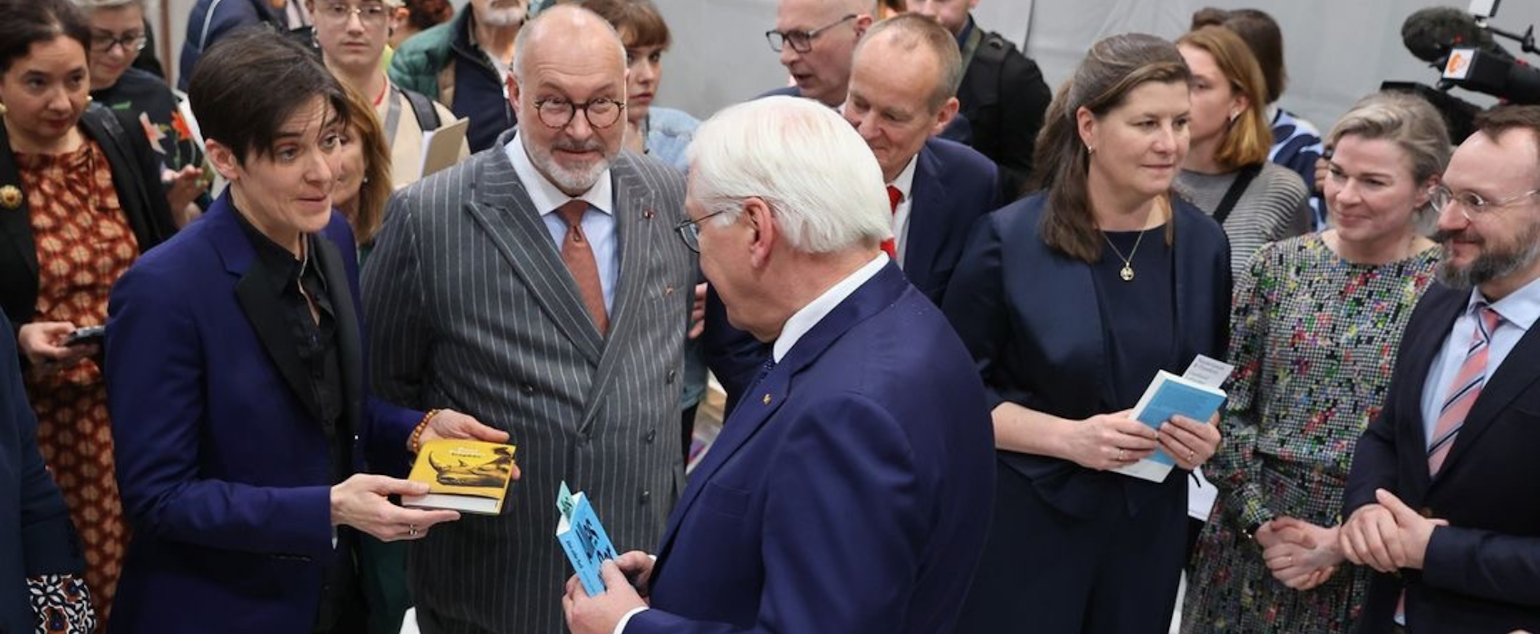
Meanwhile, ‘They Have Waited Long Enough’, a triptych by Annelies Van Parys, Aftab Darvishi and Calliope Tsoupaki, for which I wrote the libretti, is playing in the Gewandhaus. As for me, I’m sitting in Matthijs De Ridder and Anna Eble’s improvised night radio studio again, to introduce ‘Hohler Hafen’ along with Lisa. The next day I perform the poem live, with soprano Johanna Zimmer, during the poetry programme ‘Befallene Stadt’ (after having spoken about it in a reading workshop). Again I’m struck by how focused the audience listens, for an hour and a half, to fairly complex poetry by German and Dutch poets. And as with all the performances, how full the room is: people keep on coming.
Leipzig is a great fair, because it’s open to the public and it’s all about the authors. The readings, performances and interviews are not only the heart of the Buchmesse, they happen all over the city, so that literature resonates far beyond the exhibition halls.
Along with the entire ‘Trophaë’ team, we drink coffee watching the ZDF item. Bettina confesses she didn’t think I’d succeed in learning German. “All authors say they will, but nothing ever comes of it. That you actually did it is such a trump card. ... Launching a book is something you to together, as a team: the publishing house and the author.”
For three days, the merry-go-round keeps turning. I miss the breakfast with the likeable journalist of ‘Eselsohr’, a magazine about children’s and young adult literature, because of a double booking, but when I happen to run into her at the fair, she promises to take my children’s book ‘(N)Iets’ (which I made with Gerda Dendooven) with her to the fair in Bologna, “because it absolutely must find a German publisher”. So right at the end a fourth tick: attention to children’s and young adult literature.
The last night in the Schaubühne is one big party full of Flemish and Dutch authors. But duty calls. I must head home for the première of ‘Dead Ladies Show 11’. Tired but content I catch the train, which for once leaves on time. If this report has a bit less of a sparkle than normal, that may be because the past month has been rather ... er ... full. But soon I’ll be off again, with readings in Basel and Berlin, Zurich and Bremen, Esslingen and Weinfelden, Munich and Munster. The fifth printing is rolling off the presses, there’s interest in the film rights and Zsolnay wants to publish another book of mine next year. There you go, a fifth tick: sustainability, in literature too.
---
You can create success. Over the past few weeks, ‘Trophaë’ was on display in practically every German, Austrian and Swiss cultural programme on television and radio. All those interviews were strong in terms of content – nothing was jazzed up or infantilized; even during the clay pigeon shooting we discussed literary style, white gaze and post-colonial world politics. The result? My book is in all the bookshops with recommendations, on all kinds of lists, and selling extremely well. Thanks to Flanders Literature, Niederlande & Flandern 2024 and Zsolnay for making it all possible. Support works. We already excel, so let’s above all export all that excellence. And believe in it. Because we have so much quality here in house. Flemish literature is Alles ausser flach!